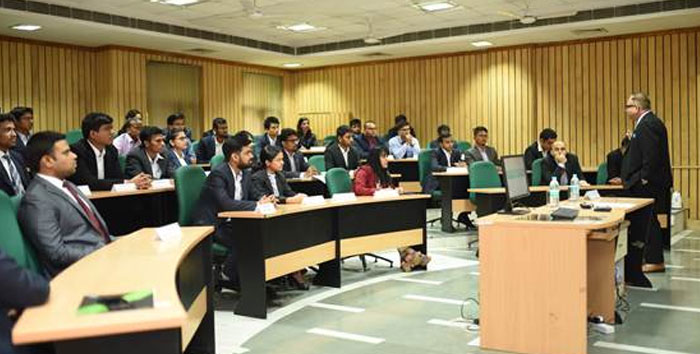 Post Graduate
Programme in Sustainable Management stresses upon the philosophy that businesses are embedded in society and cannot be separated from it, and therefore aims to develop
management professionals with a holistic perspective on economic, social and environmental issues. In addition to offering general management courses, PGPSM's
curriculum stands out in management education by means of offering specialized courses on systems thinking, social entrepreneurship, externalities, lifecycle
management, stakeholder management and public policy.
Post Graduate
Programme in Sustainable Management stresses upon the philosophy that businesses are embedded in society and cannot be separated from it, and therefore aims to develop
management professionals with a holistic perspective on economic, social and environmental issues. In addition to offering general management courses, PGPSM's
curriculum stands out in management education by means of offering specialized courses on systems thinking, social entrepreneurship, externalities, lifecycle
management, stakeholder management and public policy.
Objectives of the Programme
- To build an understanding of contemporary challenges that businesses are facing in the 21st century, with emphasis on the environment
- To build responsible leadership capabilities that are geared to respond to sustainability challenges
- To impart appropriate skillsets to integrate principles of sustainability and responsible management practices in
- To acquire knowledge and skills in key functional areas of businesses
- To encourage entrepreneurial capabilities and develop a global perspective
- To enable participants to become change agents in sustainable management
Why Sustainable Management
Businesses today are increasingly being driven by sustainability concerns. Results of surveys conducted by many leading consulting and media houses such as Forbes and Fortune indicate that no business can survive in future without incorporating sustainability principles and practices in its operations. However, this is easier said than done. Here in lies the role of Sustainable Management.
While in the past, 'sustainability' as a term was often associated and limited to environmental and social concerns, a hard realization has set-in in the recent years that businesses cannot separate themselves from society and environment. An unstable social and environmental ecology will inadvertently hurt the profit bottom line of business by making the conduct of business expensive. Hence, the only way to deal with the threat of negative environmental and sociological impact of business is to convert them into opportunities of improvements and excellence.
The PGPSM enables future managers to understand the ever evolving and interactive nature of these sustainability challenges and come up with integrated, holistic solutions.

Sustainability is an emerging field and IIM Lucknow is among the very few institutes in India, perhaps among very few in the world also, to have pioneered a Sustainable Management Programme. Needless to say, the continuously evolving knowledge in the field is more than matched by the continuous evolution of curriculum.
The programme is equipped with state of the art infrastructure in terms of audio-video enabled class rooms, extensive collection of books in the library and ready access to industries and corporate leaders.
Along with the rigorous routine of lectures, case discussions, exercises, seminars, role plays, management games ensure deeper understanding of theoretical concepts through application oriented participative learning. Team-based assignments, term papers, project work, presentation and computer-based learning methods help build an orientation towards working effectively in larger, and many a times, multi-cultural and multi-functional teams in the future workplace.
We believe that through our teaching we enable our students to acquire a unique position which may influence the very course of future. Special emphasis is laid on the development of socially and environmentally sensitive global citizens. Leadership Talks by industry leaders bring in the latest trends in sustainability and help establish a direct connect with the concepts taught in the classroom.
Academic Evaluation
The academic performance evaluation system is viewed as a means to promote learning process, and is designed to assess the ability of the student to apply knowledge for problem-solving and increasing organisational effectiveness. The evaluation is a continuous process based on assignments, quizzes, project work, seminar presentation, viva-voce, mid-term test and final examination.
A ten-point grading scale with corresponding letter grades is used as follows:
| Letter Grade | A+ | A | A- | B+ | B | B- | C+ | C | C- | D | F |
|---|---|---|---|---|---|---|---|---|---|---|---|
| Grade Point | 10 | 9 | 8 | 7 | 6 | 5 | 4 | 3 | 2 | 1 | 0 |
The Term Grade Point Average and Cumulative Grade Point Average are computed in each term as the credit-weighted averages of individual grades in and up to each term respectively. The academic criteria for continuation in the programme, promotion to Second Year, and award of diploma, are specified in the PGPSM Manual which lays down the policies and procedures governing the programme. The Manual is given to all students at the time of registration at the beginning of the academic session.
The curriculum of PGPSM is rigorous and includes specialized courses on sustainability from the first year itself, without missing out on the general management courses. In the second year, the students get exposure to sustainability in detail through well designed compulsory courses in Terms IV & V, and elective courses in Term VI
The courses offered in the two years are listed below:
| First Year Course Structure | ||
|---|---|---|
| Term I | Term II | Term III |
| Managerial Economics | Communication for Sustainable Management | Environmental and Resource Economics |
| Principles of Sustainable Management | Macroeconomic Environment | Sustainability: Measurement, Certification and Reporting |
| Quantitative Analysis for Management I | Creativity and Innovations for Sustainable Management | Quantitative Analysis for Management II |
| Accounting for Sustainable Management | Financial Decision Making | Designing Work Organizations |
| Human Dimensions of Sustainability | Systems Thinking | Information Systems |
| Behavior in Organizations | Environmental Law and Policy | Consumer Behavior |
| Sustainable Marketing Concepts | Strategic Management | |
| Operations Management | ||
| Second Year Course Structure | ||
| Term IV | Term V | Term VI |
| Climate change, Environment and Externalities Trading | Lifecycle Management | Three Elective courses |
| Research Methods for Sustainable Management | Social Entrepreneurship | Integrated Project |
| HRM for Sustainable and High Impact | Stakeholder Management and Corporate Social Responsibility | |
| Sustainable Supply Chain Management | Environment and Social Risk Management: ESG and EHS | |
| Integrated Project | Environment Finance and Sustainable/Impact Investment | |
| Public Policy Processes and Institutions | ||
| Integrated Project | ||
The second year has an integrated project for three terms (up to 9 months) as an integral part of the curriculum. With course work running in parallel, the students get a day off every week to work on live projects with industry. Periodic assessments by the faculty ensure that the students stay on track to meet project deliverables. The students get involved in projects in renewable energy, smart cities, resource optimization, green marketing, CSR portfolio management, etc. They are associated with leading organizations like Tata Sustainability Group, Soft Bank, NTPC, GIZ, ITC Infotech, Velluri Technology Accelerators, Vedanta and World Bank.
This unique aspect of the PGPSM curriculum has been well appreciated by recruiters. Firstly, the hands-on exposure gained through the integrated project gives the students a unique business orientation that goes beyond the confines of the class room. Secondly, recruiters often find the eight-week summer internship as too short an engagement to assign worthwhile projects and assess the suitability of a candidate.
| Academic Calendar 2025-26 (1st Year) | |||
|---|---|---|---|
| Lucknow Campus | Preparatory course in Mathematics Induction Module Registration |
June 12-22, 2025 June 24-25, 2025 June 26-27, 2025 |
(Thu-Sun) (Tue-Wed) (Thu-Fri) |
| Term-I | Classes Begin Mid-Term Examinations End-term Examination Term Break |
July 01, 2025 August 07-09, 2024 September 18-20, 2025 September 21-24, 2025 |
(Tue) (Thu-Sat) (Thu-Sat) (Sun-Wed) |
| Term-II | Registration & Classes begin Mid-Term Examinations End Term Examinations Term break |
Sep 25, 2025 Nov 04-07, 2025 Dec 24-29, 2025 Dec 30, 2025 -Jan 04, 2026 |
(Thu) (Tue-Fri) (Wed-Mon) (Tue-Sun) |
| Term-III | Registration & Classes begin Mid-Term Examinations End Term Examinations |
Jan 05, 2026 Feb 11-14, 2026 March 21, 2026 |
(Mon) (Wed-Fri) (Sat) |
| Academic Calendar 2025-26 (2nd Year) | |||
|---|---|---|---|
| Term-IV | Registration & Classes begin Mid-Term Examinations End Term Examinations |
June 10, 2025 July 17-18, 2025 Aug 27-28, 2025 |
(Tue) (Thu-Fri) (Wed-Thu) |
| Term-V | Registration & Classes begin Mid-Term Examinations End Term Examinations Term break |
Sep 16, 2025 Oct 23-25, 2025 Dec 08-10, 2025 Dec 11-14, 2025 |
(Tue) (Thu-Sat) (Mon-Wed) (Thu-Sun) |
| Term-VI | Registration & Classes begin End Term Examinations Convocation (Tentative Date) |
Dec 15, 2025 Feb 24–26, 2026 March 21, 2026 |
(Mon) (Tue-Thu) (Sat) |
Lucknow Visit International Immersion Convocation(Tentative Date) |
Nov 10-15, 2025 Sep 01-12, 2025 March 21, 2026 |
(Mon-Sat) (Mon-Fri) (Sat) |
Candidates should hold a Bachelor's degree in any discipline with at least 50% marks (45% in case of SC/ST/PwD category) or equivalent, with at least two years professional experience.
Shortlisted candidates would be required to submit a Statement of Purpose, the form for which will be made available.
| Sr No. | Subject | Download |
|---|---|---|
| 1. | Policy Size: 203 KB | Lang: English | Uploading Date: 28/07/2025 | Click here to View |
The CAT advertisement usually appears in the National dailies in the month of July or August.
Common Admission Test is a computer-based test (CBT). For more details about CAT, visit http://www.iimcat.ac.in
Candidates are shortlisted for the interview on the basis of their performance in the CAT, scholastic achievement and relevant work experience. Written Ability Test (WAT) and Personal Interview (PI) are then conducted at Bangalore, Hyderabad, Kolkata, Lucknow, Mumbai, and New Delhi in the end of February onward. Final selection is based on performance in CAT, scholastic achievement, work experience, and performance in the Written Ability Test (WAT) and Personal Interview (PI).
| Sr. | Activities | Timelines |
|---|---|---|
| 1 | Release of Advertisement | 27th July 2025 (Sunday) |
| 2 | Online Registration for CAT | 01st August 2025 to 13th September 2025, 05:00 PM |
| 3 | Admit Card Download Window | 05th November 2025 to 30th November 2025 |
| 4 | Exam Date | 30th November 2025 (Sunday) |
| 5 | Release of the CAT Result | first week of January 2026 (Tentative) |
Demand Draft:
Online Transfer:
Present corporate scenario mandates a 'Glocal' perspective which includes an in depth understanding of localized risks and challenges as well as a unified global strategy to strive towards holistic development. At IIM Lucknow we are committed to developing and implementing educational programmes and research projects that would enhance the understanding of global issues. IIM Lucknow has been promoting interaction with the rest of the world by designing, developing and implementing international programmes with partner business schools globally. Our students and faculty regularly participate in global interaction forums like conferences, symposium, conclaves and exchange programmes.
The international immersion module of PGPSM sensitizes the participants towards the best practices and robust administrative structures which exist in many countries in Europe, specially Scandinavia.
A two week compulsory sojourn in world renowned institutions like Copenhagen Business School Linnaeus University and Aalborgh University is aimed at enriching the experience of a meaningful immersion. The rigorous academic schedule is highly complemented with a conscious and deliberate industry interaction. Experts from organizations like IKEA, Dong Energy and Rockwool, which have set high benchmarks for sustainability in their respective sectors, interact closely with the students and share varied perspectives. Students also actively engage with local municipal bodies and citizen groups who are often instrumental in bringing about behavioural changes in society towards sustainable living. The program also creates a platform for cultural exchange among participants and the local community.
| Sr No. | Subject | Download |
|---|---|---|
| 1. | Fee Structure-PGPSM-1 & II for Academic Year 2025-2027 | Click here to View |
| 2. | Fee Structure-PGPSM-1 & II for Academic Year 2024-2026 | Click here to View |
| 3. | Fee Structure-PGPSM-1 & II for Academic Year 2023-2025 | Click here to View |
-
Ms. Johara (PGPSM Office) +91-120-6678517 pgpsmoffice[at]iiml[dot]ac[dot]in
Final Placements (2015-17 Batch)
Indian Institute of Management-Lucknow is pleased to release the data related to final placement of the first batch of Post Graduate Programme in Sustainable Management (PGPSM). PGPSM was inaugurated in 2015 and the first batch comprised of 19 students with an average work experience of 4.5 years. The final placement witnessed the participation of organizations from diverse sectors involved in sustainability related work such as consulting, energy, urban transport, apparel, financial services, and social sector.
One student opted out of the placement process to pursue higher education. Overall 16 students have received job offers from organizations in consulting (EY, KPMG, PwC), energy (Energy Efficiency Services Limited, Mytrah Enegry, Vikram Solar), financial services (Tres Vista), and social sector (Tata Strive, Tata Trust). Other companies which participated in the placement process include Accenture, Cargill Foods, Lavaasa, McKinsey & Co., Solaron, Treeni, and UMTC. Maximum offers were made by the consulting firms (50%), followed by energy (25%),
social sector (19%), and financial services (6%). Roles on offer included senior consultants, business development, business strategy etc. Two students are in touch with organizations to arrive at a final decision.
IIM Lucknow is the first IIM and one of select management institutes in India to offer a full time residential programme in the field of sustainability. The heartening response from the industry establishes IIM Lucknow as the preferred recruitment partner for sustainability related roles in India and reaffirms the trust organizations have shown in IIM Lucknow over the years.
Prof Sourindra Bhattacharjee, Chairperson of PGPSM Placements said “We are glad to that we were able to build on the foundations of successful summer placements of the first two batches of PGPSM. The institute provided a platform for the students to explore career in diverse sectors related to sustainability and the response from the industry was an indicator of the student quality, academic rigour, and values of IIM Lucknow“.
Summer Placements (2016-18 Batch)
Summer internships have been offered to the students by a wide range of companies from various sectors. Mahindra, Tata Sustainability Group, Wipro, Cairn Energy, PwC, KPMG, Azim Premji Foundation, Wipro Earthian-CSTEP, BIOME, Valluri Technology Accelerators, Sweep Enviro, UPL and Biocon are some of the companies that have recruited interns in varied roles in sustainability. Across the batches, roles offered have been in the domain of smart city consulting, sustainability reporting, rural development, social and community inclusion, renewable energy solutions, corporate social responsibility, environment, waste management, carbon neutrality and pricing.








